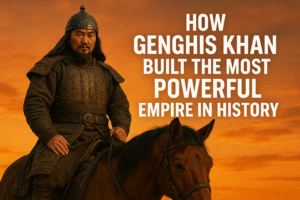Emperor Shenzong of Song led with bold reforms and intellectual vision, attempting to strengthen China’s future during a turbulent yet pivotal period.
- The Rise Of Emperor Shenzong And The State Of The Song Dynasty
- Wang Anshi And The New Policies That Divided The Court
- Military Struggles And Shenzong’s Northern Ambitions
- Cultural Achievements And Intellectual Debates During His Reign
- Shenzong’s Final Years And The Undoing Of Reform
- Legacy Of A Reformist Emperor And The Lessons For Modern Governance
- Follow My Journey And Get Inspired To Transform Your Life For The Better
The Rise Of Emperor Shenzong And The State Of The Song Dynasty
In the heart of the 11th century, the Song Dynasty stood as a cultural and intellectual powerhouse, yet it faced pressing internal and external challenges. It was in this climate that Emperor Shenzong ascended the throne in 1067 at the age of 19, following the death of his father, Emperor Yingzong. Born Zhao Xu in 1048, Shenzong inherited more than just the imperial seal—he inherited a country that needed reorganization, reinvigoration, and resilience.
The Song Dynasty at the time was defined by scholarly bureaucracy, a flourishing economy, and deep cultural richness, but also by military weakness and burdensome fiscal policies. The empire’s growing expenditures, especially military outlays to maintain peace with powerful northern neighbors like the Liao dynasty, strained the treasury. It was clear that the empire could not survive on tradition alone. A new approach was needed, and Shenzong believed he had found the answer in an ambitious young official named Wang Anshi.
Wang Anshi And The New Policies That Divided The Court
Shenzong’s reign is most remembered for its bold attempt at systemic reform through a sweeping program known as the New Policies or Xin Fa. The mastermind behind these reforms was Wang Anshi, a statesman, economist, and philosopher who believed China’s deep-seated problems—inefficient administration, rural poverty, and military vulnerability—could be resolved through calculated policy shifts.
Wang Anshi’s reforms covered a broad range of areas:
- Green Sprouts Program: Aimed at giving low-interest loans to peasants during planting season to reduce their dependency on exploitative moneylenders.
- Equitable Transport Policy: Sought to stabilize grain prices and improve state control over the transport and distribution of goods.
- Baojia System: A communal system for self-governance and law enforcement among rural populations, designed to reduce the state’s reliance on a traditional military.
- Exam Reforms: Focused more on practical knowledge and less on memorization of Confucian texts, intending to modernize the civil service.
While Emperor Shenzong was a genuine supporter of these reforms, believing they would rejuvenate the empire, not everyone shared his optimism. Court officials, Confucian purists, and entrenched aristocrats pushed back hard. They viewed the reforms as radical disruptions to tradition, accusing them of moral decay and impracticality. Factionalism deepened, and the court became a battlefield between reformists and conservatives.
Military Struggles And Shenzong’s Northern Ambitions
Beyond economic policy and governance, Emperor Shenzong was also keen to address what he saw as a growing embarrassment—the military weakness of the Song Dynasty. The Liao Dynasty, ruled by the Khitan people to the north, had long held territorial dominance over parts of China. Since the humiliating Chanyuan Treaty in 1005, Song emperors had paid annual tribute to the Liao to maintain peace.
Shenzong wanted to reverse that status quo. He believed that reforms would strengthen the state’s capacity to confront the Liao militarily. Inspired by a sense of justice and national pride, and armed with a reformed military structure thanks to Wang Anshi’s policies, Shenzong initiated a northern campaign in 1074.
Unfortunately, the outcome did not reflect the emperor’s ambition. The campaign was plagued by logistical issues, ill-prepared troops, and internal miscommunication. Despite some minor victories, the overall effort failed to reclaim the coveted Sixteen Prefectures or alter the strategic balance. Worse still, the costly conflict further strained the empire’s finances and cast doubt on the effectiveness of the reforms.
Cultural Achievements And Intellectual Debates During His Reign
Even amid political friction and military ventures, the Song Dynasty under Emperor Shenzong remained one of the most culturally and intellectually fertile periods in Chinese history. Scholars, poets, painters, and philosophers thrived in the empire’s many academies and courts.
Neo-Confucianism began taking deeper root during this time, led by thinkers like Cheng Hao and Cheng Yi, who later influenced Zhu Xi, one of the most important Confucian scholars in Chinese history. These intellectuals debated the meaning of virtue, the role of government, and the nature of human morality—all discussions that found echoes in the policies being enacted and criticized in Shenzong’s court.
Literature also blossomed. Although Shenzong himself was not a noted poet like some emperors, he patronized artists and scholars, ensuring the preservation and promotion of Chinese classics. In this vibrant intellectual environment, the contradictions of the Song era were laid bare: an empire deeply invested in moral integrity but also teetering on the edge of administrative breakdown.
Shenzong’s Final Years And The Undoing Of Reform
By the early 1080s, the emperor’s health began to deteriorate. Tuberculosis gradually weakened his body, though not his conviction. He continued to support Wang Anshi’s reforms, even after the latter temporarily resigned under immense political pressure. But as Shenzong’s strength waned, so too did his ability to enforce his vision.
In 1085, Emperor Shenzong died at the age of 36. His early death triggered a dramatic shift in court politics. His successor, Emperor Zhezong, was still a child, and real power fell into the hands of Empress Dowager Gao, a staunch opponent of the New Policies. Almost immediately, the reforms were halted, and many of Wang Anshi’s initiatives were reversed. Wang himself retreated from politics and died a few years later in relative obscurity.
The brief but bold reformist era of Shenzong had come to an end. The dreams of a reinvigorated Song state were replaced by the familiar caution of tradition-bound governance. Yet, the legacy of Shenzong’s efforts would live on in China’s long intellectual history and serve as a case study of the risks and rewards of radical governance.
Legacy Of A Reformist Emperor And The Lessons For Modern Governance
Though Emperor Shenzong’s reign did not yield immediate or lasting structural success, his legacy is far from failure. His era was one of visionary courage and intense debate, where the challenges of governance were met with an unprecedented attempt at innovation. His trust in intellect over dogma, his commitment to elevating the rural poor, and his belief in the strength of an empowered state make him stand out among China’s imperial rulers.
The New Policies themselves have drawn mixed historical evaluations. Some historians see them as noble but naive; others as necessary but prematurely implemented. What remains undeniable is that Shenzong was one of the few emperors in Chinese history who dared to confront deep systemic problems head-on rather than merely manage decline.
In a world increasingly grappling with inequality, stagnant institutions, and globalized uncertainty, the reign of Emperor Shenzong still resonates. It raises timeless questions: Can bold reforms be sustained without broad consensus? Can idealism survive within bureaucratic systems? And can a ruler, however sincere, outpace the inertia of history?
Shenzong may not have lived to see his dreams fulfilled, but he lit a fire of discourse that would burn throughout Chinese political thought for centuries to come.
I am working on building a passive income stream using the internet. If you would like to do the same take a look at this business by clicking here.
This business can be operated using the internet and the start up cost is low. I don’t have to leave my current employment to work on building this global business.
If you like what you see, work with me to build a passive income stream using this global business.
I do not provide personal investment or financial advice and I am not a qualified licensed investment advisor. I am documenting my online investment and financial journey and what’s working for me. Click Here to read disclaimer.
If you found value in this post and want to support my work, click here to buy me a coffee.
Subscribe to my list for valuable updates, tools, videos and articles that I will share as I come across them.
Let me know your thoughts on this post via the comments section. You can also add your insights and suggestions.
If you enjoyed reading this post or it added some value, please share it with others.

Follow My Journey And Get Inspired To Transform Your Life For The Better
“I may earn commissions as an affiliate from sponsored links within this post”





